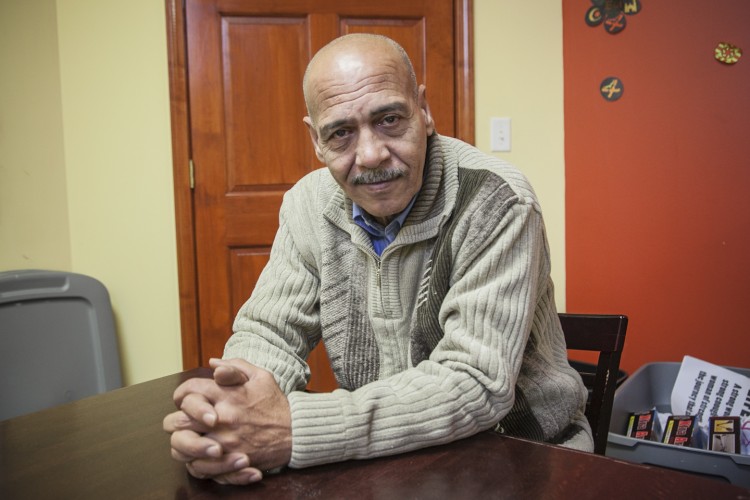
A fragile sense of security often robs Zuhair Sulaiman of the luxury of good night’s sleep.
“The fear is embedded inside,” he said in Arabic at a meeting at Arab American Family Services in Bridgeview.
Along with more than 700,000 Palestinian Arabs, who abandoned their homes, his family fled to Iraq when Israel was created in the 1948 Arab-Israeli War.
He lived in Iraq as a Palestinian refugee with no citizenship papers for 54 years before applying to come to the United States as a refugee.
Now, living in Chicago as an Iraqi refugee, Sulaiman, 58, is grateful to be in a safe and secure country, but nightly dreams of death, and fears for his children when they leave the house.
“I saw too many things in Iraq; too many dead bodies, too many dead children, too many heads cut off in the street and too much blood.”
But here he faces new struggles—many of them not unlike those faced by others seeking sanctuary in America.
He struggles with poverty because of the brief help offered by the U.S. government. He struggles to pay the government back for his family’s flight America. And he struggles to find his feet in a place that’s so different from what he’s always known.
Living in the Al-Waleed refugee camp in Iraq, near the border with Syria and the Al-Tanf crossing, Sulaiman applied to come to the United States through the Office of the United Nations High Commissioner for Refugees (UNHCR).
With the help of World Relief-Chicago, Sulaiman, his wife Allaay, and their five children, who were born into refugee status in Iraq, were relocated to various areas of Chicago in 2010. Sulaiman lives with his wife and three of his children in the North Side neighborhood of Albany Park.
“I am a double refugee and a person without a land,” said Sulaiman. He said Iraq doesn’t recognize him as a citizen, took away his papers and treated him as an outcast. And since Palestinians do not have their own country, and there is no passport stamped “Palestine,” he is a man without a place to call home.
As refugees, he and his family received assistance from the U.S. government when they arrived, but were eventually forced to seek aid on their own. Sulaiman found help at Arab American Family Services, but he says more could be done to assist the refugees.
After the 2003 start of the Iraq war, the Palestine population in Iraq, an estimated 34,000 people according to UNHCR, decreased by almost half. When Baghdad was attacked, many Palestinians fled to the nearest no-man’s land, a desert area along the Syrian border, and set up camp.
Al-Waleed was formally recognized as a refugee camp in 2006 and by 2009 it had over 1,500 Palestinian residents who fled or were expelled from Baghdad.
The conditions that Sulaiman and his family faced at Al-Waleed, living in tents, were dire. Temperatures fell below freezing in the winter and rose above 122 degrees in the summer, scorpions and snakes ran rampant, sandstorms were common, and the nearest hospital was four hours away.
The toll of life there was both physical and mental. “There were bombs everywhere, we lived in fear of death,” he said. “Iraq was very bad.”
Dr. Edith Szanto, who teaches at the American University of Iraq, Sulaimani, is also a volunteer with FirstStage, a program that teaches reading and writing to Arab children in the Qalawa refugee camp in Iraq’s autonomous region of Sulaimani.
She said refugees in Iraq are most often viewed as gypsies, and a sense of hopelessness often leads children to begging and prostitution.
“Iraqis’ and Iraqi refugees’ problems, such as depression and paranoia, are deep-seated social problems,” she said. “If a poor mental state is not the result of the Iraq war, it’s from the 10 years of U.N. sanctions before that, and then before that there were the 10 years of the Iranian-Iraq war; these people have not seen normal lives for decades.”
Last year, more than 56,000 refugees arrived in the U.S., and 598 Iraqi refugees resettled in Illinois, according to the U.S. Department of Human Services. Over a span of 20 years, Illinois has welcomed approximately 3,700 Iraqi refugees. For the fiscal year 2012, the State Department provided a one-time payment of $1,100 per refugee upon arrival in Illinois.
Refugees arriving in the U.S. are placed with a resettlement agency, such as World Relief-Chicago, that has signed a cooperative agreement with the State Department. The affiliates are responsible for assuring that the refugees receive aid for the first 30 to 90 days after arrival, arranging for services such as food, housing, clothing, employment services and follow-up medical care.
Income eligible single adult refugees, and married couples without children, are eligible for Refugee Cash and Medical Assistance, from the Office of Refugee Resettlement, Department of Health and Human Services (ORR), for eight months from the date of arrival.
Families with children are eligible for Transitional Aid for Needy Families (TANF) for up to five years. Eligibility criteria for these services often parallel the state’s Medicaid programs.
Refugees are must pay for the cost of their plane ticket, though. The U.S. government is reimbursed for the costs expended of the refugees’ flights by the refugees’ sponsor agencies. These agencies then set up payment plans for the refugees.
Sulaiman said when he resettled in Illinois in 2010 the US provided every member of his family $900. He received two months of aid from World Relief-Chicago before they “took their hand away.” Now he pays about $50 a month to cover a $5,000 debt for the plane tickets that brought him and his family to Chicago.
Once World Relief-Chicago stopped supporting Sulaiman and his family, he had to seek out aid from a social service agency. One of his married daughters was resettled in Bridgeview, and through word-of-mouth he was able to reach out to Arab American Family Services, for services such as English-language tutoring. He and his wife are also seeing a therapist though Heartland Alliance,
“A refugee doesn’t become a refugee because they want to, no one chooses to be a refugee, these are individuals who are ousted from their countries because they can’t rely on their government to protect them,” said Aimee Hilado, Ph.D., manager of Clinical Social Work and Wellness Services at RefugeeOne, an independent non-profit refugee resettlement agency in Chicago.
“We would see clients in English classes unable to concentrate, feeling very anxious and not wiling to come to class (because of depression or paranoia), when we know that they need the language to get the job,” she said. “Flashbacks from trauma can infiltrate and negatively influence a refugee’s ability to thrive in their environment.”
Post-traumatic stress disorder and depression is a serious problem for Iraqi refugees, Hilado added. Hearing sirens on the street or the sound of a plane overhead can trigger an intrusive flashback.
“A person is not going to thrive in any of the resettlement programs that we offer if they are constantly having flashbacks or thoughts of suicide as a result of depression,”
Sulaiman and his wife attend weekly therapy sessions through Heartland Alliance’s International Family, Adult, and Child Enhancement Services (FACES), in Chicago’s Uptown neighborhood.
He said he needs help adjusting to the freedom he feels in the U.S. He isn’t used to being able to go out into the streets without being hurt or “found.” He and his family can’t believe they’ve finally reached a place of safety.
“Iraqi refugees experience extreme shell-shock when they get here,” said Itedal Shalabi, founder and executive director of Arab American Family Services (AAFS). “How can you send someone to find a job when he or she has a mental illness and they need help to stabilize?”
Shalabi said the resources available to refugees are often good in theory, but executed poorly.
“Refugees’ expectations are very high based off what the American government promised them, but the response is not always as dignified as it should be; a lot of them are left to fend with inadequate furniture and clothing, mental health issues, children trying to adjust to new schools and parents who don’t know their rights because they come from countries where they had none.”
“Things are given to refugees when they first arrive, but often they are given fish and not taught how to fish,” said Shalabi.













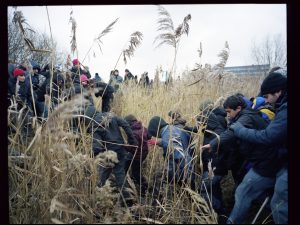

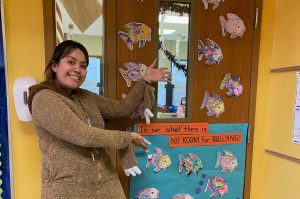
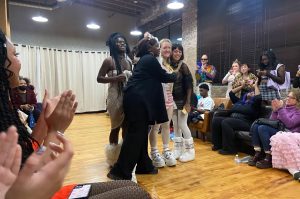
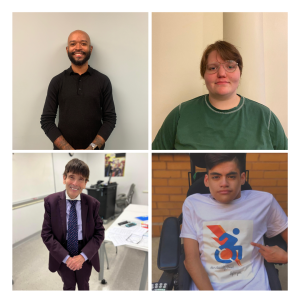
Be First to Comment